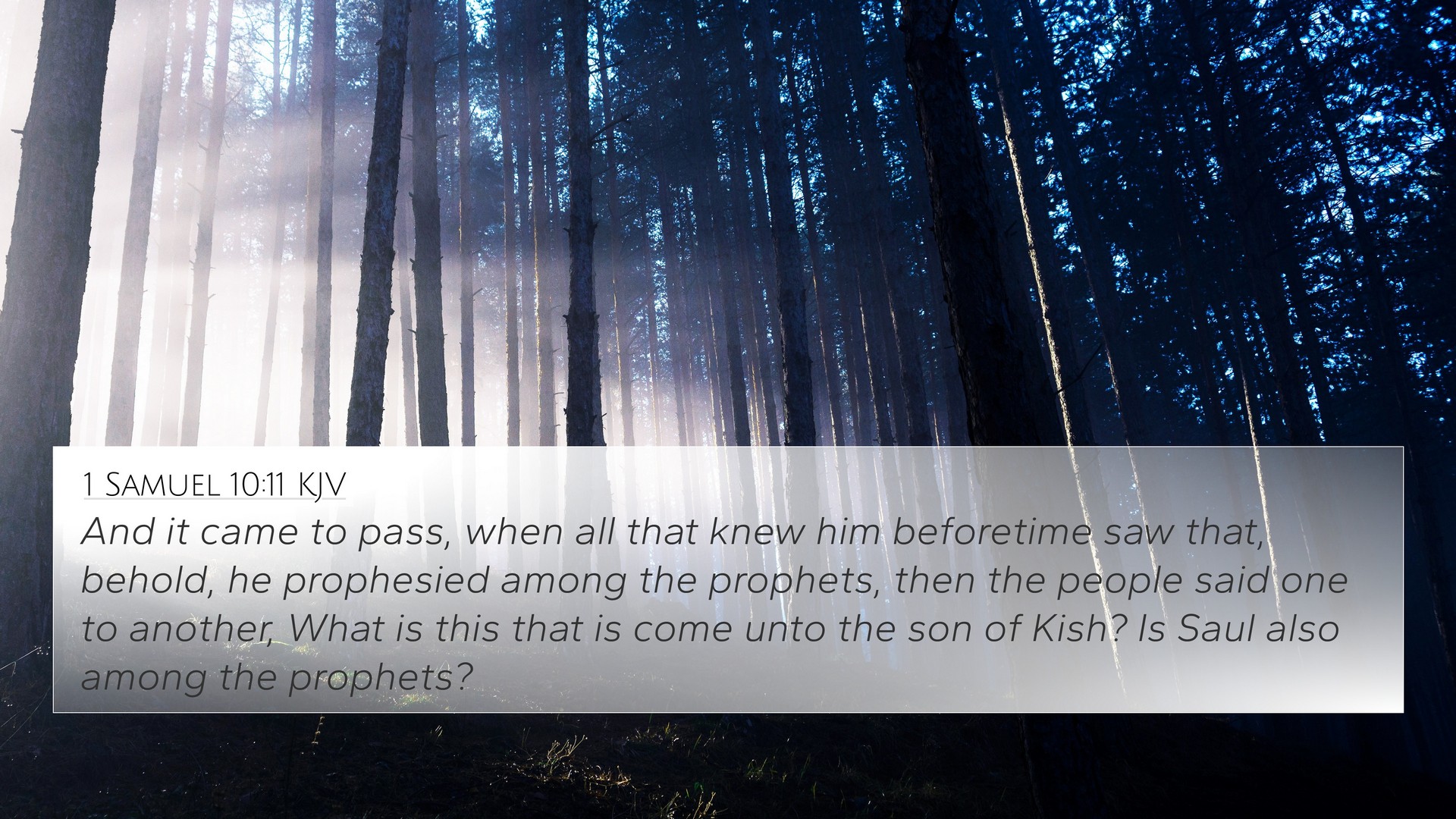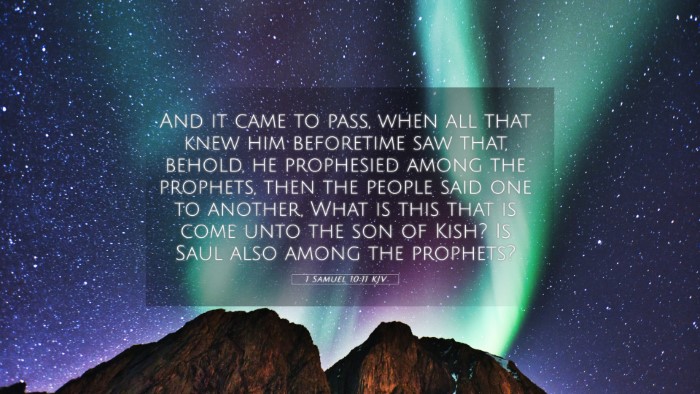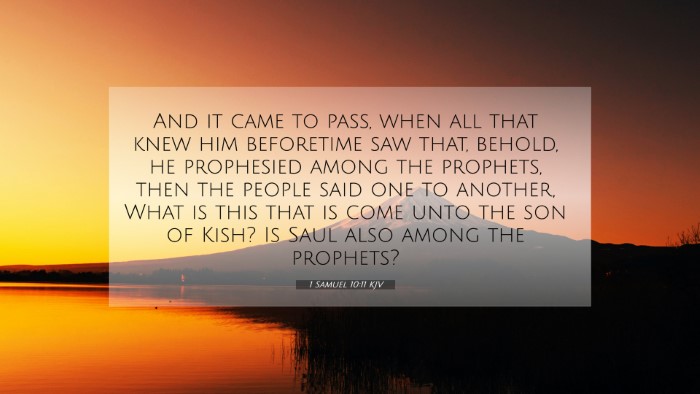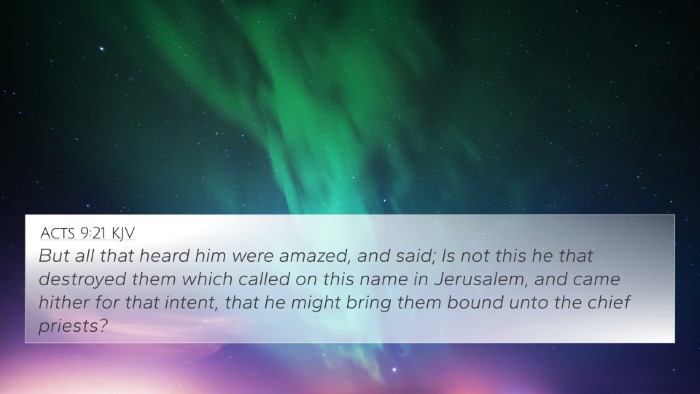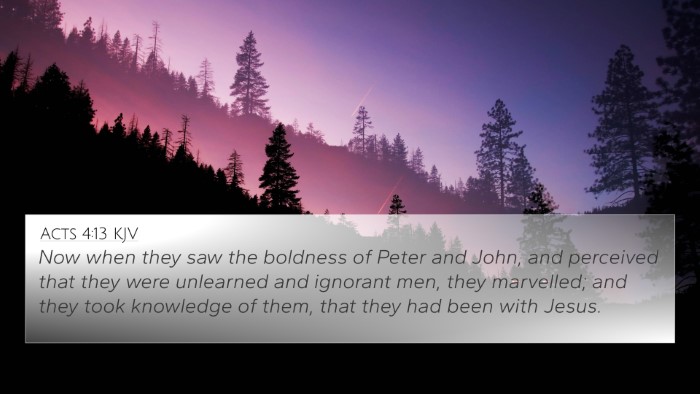Understanding 1 Samuel 10:11
"And it came to pass, when all that knew him beforetime saw that, behold, he prophesied among the prophets, then the people said one to another, What is this that is come unto the son of Kish? Is Saul also among the prophets?"
Summary and Context
The verse is a pivotal moment that not only defines Saul's transformation but also highlights the extraordinary work of God through him. In this context, Saul's unexpected prophetic utterance astonishes those who knew him, prompting questions about his newfound role among the prophets.
Insights from Public Domain Commentaries
Matthew Henry's Commentary
Matthew Henry emphasizes that this incident signifies Saul's divine election and preparation for kingship. He observes that Saul's prophesying indicates that God equips those He chooses for His service. Henry points out the surprise of the people, indicating that God can change anyone's life and equip them for His purpose irrespective of their past.
Albert Barnes' Notes on the Bible
Albert Barnes notes that prophesying here refers to the inspirational speaking by Saul. He explains that such a transformation from a mere Benjaminite to a prophet reflects the deep workings of the Holy Spirit. Barnes also relates the astonishment of the onlookers to the surprising ways God can operate through anyone, no matter how unlikely they may seem.
Adam Clarke's Commentary
Adam Clarke points out that the phrase "Is Saul also among the prophets?" is laden with incredulity. He remarks on the cultural aspect, where prophets were individuals set apart by God, and notable that Saul, a former humble farmer, is caught up in this spiritual vocation. Clarke highlights the implications of this turn of events, implying that God can elevate the humble for His service.
Bible Verse Cross-References
- 1 Samuel 10:6: Highlights the coming of the Spirit upon Saul, which precedes this event.
- Numbers 11:29: Reflects on the notion that all God’s people may prophesy, connecting to Saul's experience.
- Joel 2:28: Prophecy of the Spirit being poured out on all flesh, relevant for understanding prophetic ministry.
- Acts 2:17: New Testament fulfillment of Joel’s prophecy about prophesying.
- 1 Chronicles 10:13-14: Discusses God’s withdrawal from Saul due to his disobedience, showing the volatility of divine favor.
- 2 Peter 1:21: Clarifies that "no prophecy ever came by the will of man," substantiating the divine origin of true prophecies.
- Romans 11:29: Supports the idea that God’s gifts and calling are irrevocable, paralleling the empowerment of Saul.
Thematic Connections
This verse invites deeper exploration into the theme of divine selection and empowerment. The juxtaposition of Saul's previous life and his prophetic calling illustrates the transformative power of God.
Applying Cross-Referencing to Biblical Study
The significance of 1 Samuel 10:11 extends beyond its immediate narrative, linking it to broader themes within Scripture. For those seeking to engage in cross-referencing Bible study, using tools such as a Bible concordance or a cross-reference guide can greatly enhance understanding.
Consider the following methods for utilizing cross-references effectively:
- Identifying thematic connections: Look for similar themes across both Old and New Testaments.
- Using Bible study guides: These can provide structured paths through related verses.
- Exploring Compiler Resources: Look into comprehensive Bible cross-reference materials that catalog similar scriptures.
Conclusion
The story surrounding 1 Samuel 10:11 shows God's ability to transform lives and positions. Understanding this verse profoundly enriches one’s grasp of Scripture and God's overarching narrative of redemption and empowerment.
